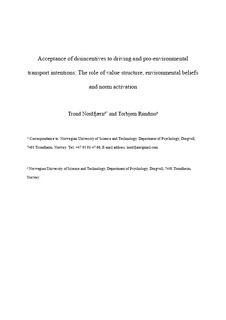Acceptance of disincentives to driving and pro-environmental transport intentions: the role of value structure, environmental beliefs and norm activation
Journal article, Peer reviewed
Accepted version

View/
Date
2018Metadata
Show full item recordCollections
- Institutt for psykologi [3086]
- Publikasjoner fra CRIStin - NTNU [38070]
Abstract
In order to facilitate pro-environmental transport mode use it is important to promote acceptance for disincentives to driving and intentions to use public transport. The present study aims to investigate values, environmental beliefs and norm activation as predictors of these psychological cognitions. In addition, we examine gender differences in the psychological constructs entered into the model. A questionnaire-based survey was carried out in a randomized representative sample of the Norwegian population (n = 1043). The results showed that the model was well-suited to explain acceptance of disincentives to driving and, to a lesser extent, intention to use public transport. Biospheric values were strongly related to an elevated ecological worldview, whereas egoistic values were associated with a weaker ecological worldview. The values had indirect relations to acceptance of disincentives to driving and intention to use public transport through the ecological worldview and Norm activation model (NAM) components, but altruistic values were found to be associated with ascription of responsibility. Females reported stronger biospheric and altruistic values, and weaker egoistic and hedonic values than males. Females also reported a stronger ecological worldview and more awareness of consequences and personal norms in the NAM. Policy planners may focus on values, environmental beliefs and norm activation in order to increase the acceptance of disincentives to driving. A broad approach, which accounts for additional factors such as transport availability, spatial factors and ‘pull’ measures, may be more suitable to promote intentions of public transportation mode use.